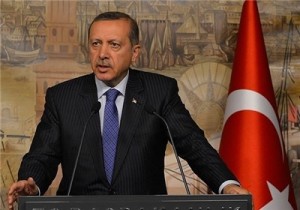 The Turkish Prime Minister, Recep Tayyip Erdogan, says he favours the retrial of hundreds of military officers convicted of plotting to overthrow the government.
The Turkish Prime Minister, Recep Tayyip Erdogan, says he favours the retrial of hundreds of military officers convicted of plotting to overthrow the government.It comes after his senior adviser suggested that the officers had been framed by the police and judiciary.
Hundreds of people were jailed in 2012 and 2013 in two high-profile cases, called Sledgehammer and Ergenekon.
Correspondents say the remarks represent a political turnaround.
Probe
"Our position on a retrial is a favourable one," Mr Erdogan told reporters in Istanbul on Sunday.
"First we must establish the legal grounding for fresh trials."
It comes as political tensions run high over alleged corruption in the Turkish government. Mr Erdogan has accused the police and judiciary of orchestrating a probe which led to the resignation of his ministers.
The ruling AK Party is rooted in political Islam and has moved to curb the power of the Turkish military, which sees itself as guardian of the modern secular state founded by Mustafa Kemal Ataturk.
The prime minister now appears to have taken the side of the military he once opposed, says the BBC's James Reynolds in Istanbul. In recent days, the army has filed a criminal complaint calling for retrials.
During the early years of his administration, Mr Erdogan formed an unofficial alliance with prosecutors in an effort to remove the military from politics, our correspondent says.
This effort culminated with two major trials relating to separate alleged plots - Sledgehammer and Ergenekon. They were seen as major challenges to Turkey's secularist traditions.
But in December, some of the same prosecutors involved in those investigations ordered the arrest of a number of the prime minister's own allies.
Power struggle
Three ministers resigned after their sons were arrested, along with dozens of others, over alleged wrongdoing in construction contracts and deals with Iran.
Mr Erdogan condemned the investigation as a "dirty plot".
The armed forces then suggested that this "plotting" also included the convictions of officers, and demanded a retrial.
The former armed forces chief, Gen Ilker Basbug, was among dozens of people given long jail terms. Lawyers, politicians and journalists were convicted, along with many military officers.
Analysts say the latest dispute over corruption is part of a power struggle between Mr Erdogan's government and an influential US-based Muslim cleric, Fethullah Gulen, who is said to have many followers within Turkey's police and judiciary.
For decades, the armed forces were the ultimate arbiter in Turkish politics.
Between 1960 and 1997, the military forced out four civilian governments.
But over the last decade, Mr Erdogan's government has changed the balance of power in Turkey.
By BBC
The Iran Project is not responsible for the content of quoted articles.










